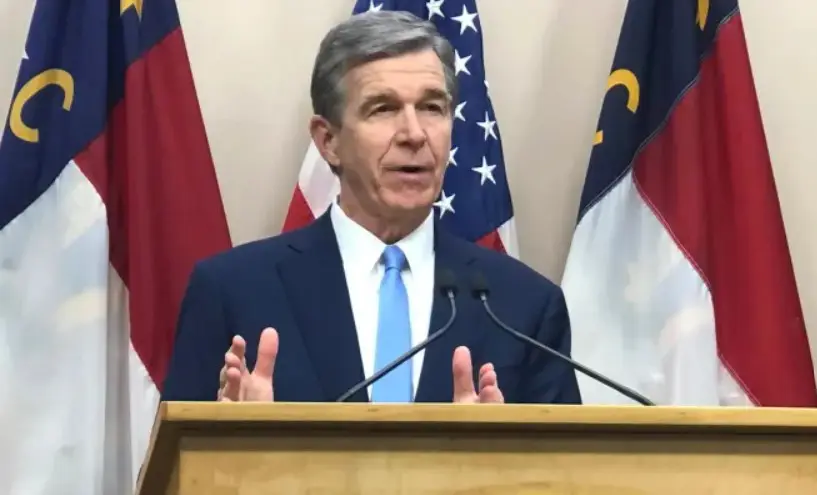Overhead Resistance Stacks up — Bitcoin’s Next Expansion Move Could
Governor Cooper Vetoes CBDC Ban During Legislative Support
(Originally posted on : Crypto News – iGaming.org )
Governor Roy Cooper of North Carolina has vetoed a bill intended to prevent the state from adopting a digital currency produced by the US Federal Reserve called a central bank digital currency (CBDC). Cooper felt the bill was “premature, vague, and reactionary,” which is why he decided on June 5 not to sign it into law even though it had received substantial support in both legislative chambers.
With 109-4 votes in the House and 39-5 votes in the Senate, House Bill 690, which sought to forbid the state from establishing a CBDC, was passed with great support. But among lawmakers and proponents of the sector, Cooper’s veto has sparked controversy and disappointment.
Political Motivations Questioned
Many critics argue that Cooper’s veto was politically driven. Representative Julia Howard expressed frustration, accusing Cooper of being “unwilling to put partisan politics aside” for the good of North Carolinians. Dan Spuller, head of industry affairs at the Blockchain Association, echoed this sentiment, describing the veto as a missed opportunity for the state to oppose the implementation of a CBDC.
Despite this backlash, there is potential for the legislature to override the veto. A three-fifths majority in both chambers could achieve this, given the bill’s initial strong support.
Federal Reserve Chair Jerome Powell has stated that the US is not close to adopting a CBDC. In a Senate Banking Committee hearing in March, Powell remarked that the country was “nowhere near recommending or adopting a CBDC in any form.” Despite these assurances, the topic remains contentious.
New players only. Exclusive Welcome Bonus of 177% + 77 Free Spins
Proponents of the ban argue that a CBDC could lead to increased government surveillance and control over financial transactions. They fear that privacy and financial autonomy could be compromised. Conversely, opponents of the ban believe these concerns are premature, given the current stage of CBDC development.
The strong legislative support for House Bill 690 reflects a growing unease about the potential implications of a CBDC. Many legislators and constituents are wary of how a federally issued digital currency could affect privacy and financial freedom.
It is unclear what the legislature of North Carolina will do in the future. They might try to override Cooper’s veto in order to publicly criticize CBDCs. The nationwide discussion concerning the future of digital currencies and government regulation is reflected in this debate in North Carolina.
A contentious discussion has been sparked by Governor Cooper’s veto, underscoring the difficulties and disagreements surrounding the regulation of digital currencies. Although CBDCs’ future in the US is still uncertain, talks in North Carolina shed light on the more significant problems that states and federal organizations are facing as they attempt to manage the rapidly changing world of digital finance.







 Bitcoin
Bitcoin  Ethereum
Ethereum  Tether
Tether  XRP
XRP  USDC
USDC  Solana
Solana  TRON
TRON  Dogecoin
Dogecoin  Lido Staked Ether
Lido Staked Ether  Figure Heloc
Figure Heloc  Bitcoin Cash
Bitcoin Cash  WhiteBIT Coin
WhiteBIT Coin  Cardano
Cardano  USDS
USDS  LEO Token
LEO Token  Wrapped stETH
Wrapped stETH  Hyperliquid
Hyperliquid  Chainlink
Chainlink  Wrapped Bitcoin
Wrapped Bitcoin  Ethena USDe
Ethena USDe  Binance Bridged USDT (BNB Smart Chain)
Binance Bridged USDT (BNB Smart Chain)  Canton
Canton  Monero
Monero  Stellar
Stellar  USD1
USD1  Wrapped eETH
Wrapped eETH  Rain
Rain  Hedera
Hedera  sUSDS
sUSDS  Dai
Dai  Zcash
Zcash  Litecoin
Litecoin  Coinbase Wrapped BTC
Coinbase Wrapped BTC  PayPal USD
PayPal USD  Avalanche
Avalanche  Shiba Inu
Shiba Inu  WETH
WETH  Sui
Sui  Toncoin
Toncoin  World Liberty Financial
World Liberty Financial  USDT0
USDT0  Cronos
Cronos  Tether Gold
Tether Gold  MemeCore
MemeCore  PAX Gold
PAX Gold  Uniswap
Uniswap  Polkadot
Polkadot  Mantle
Mantle  Ethena Staked USDe
Ethena Staked USDe  BlackRock USD Institutional Digital Liquidity Fund
BlackRock USD Institutional Digital Liquidity Fund  Aave
Aave  Falcon USD
Falcon USD  Aster
Aster  Pepe
Pepe  Bittensor
Bittensor  OKB
OKB  Global Dollar
Global Dollar  Bitget Token
Bitget Token  Circle USYC
Circle USYC  Ripple USD
Ripple USD  syrupUSDC
syrupUSDC  HTX DAO
HTX DAO  Pi Network
Pi Network  Sky
Sky  Ethereum Classic
Ethereum Classic  BFUSD
BFUSD  NEAR Protocol
NEAR Protocol  Ondo
Ondo  Superstate Short Duration U.S. Government Securities Fund (USTB)
Superstate Short Duration U.S. Government Securities Fund (USTB)  Pump.fun
Pump.fun  Internet Computer
Internet Computer  Gate
Gate  POL (ex-MATIC)
POL (ex-MATIC)  KuCoin
KuCoin  Cosmos Hub
Cosmos Hub  Worldcoin
Worldcoin  Jupiter Perpetuals Liquidity Provider Token
Jupiter Perpetuals Liquidity Provider Token  Midnight
Midnight  NEXO
NEXO  Jito Staked SOL
Jito Staked SOL  Ethena
Ethena  USDtb
USDtb  Binance-Peg WETH
Binance-Peg WETH  Spiko EU T-Bills Money Market Fund
Spiko EU T-Bills Money Market Fund  Rocket Pool ETH
Rocket Pool ETH  Official Trump
Official Trump  Algorand
Algorand  Binance Bridged USDC (BNB Smart Chain)
Binance Bridged USDC (BNB Smart Chain)  USDD
USDD  Render
Render  Wrapped BNB
Wrapped BNB  Janus Henderson Anemoy AAA CLO Fund
Janus Henderson Anemoy AAA CLO Fund  Function FBTC
Function FBTC